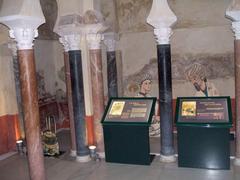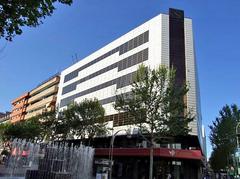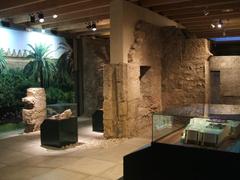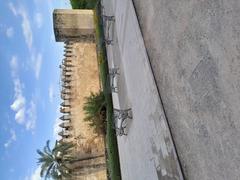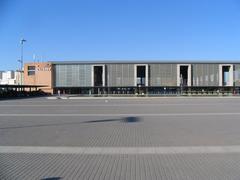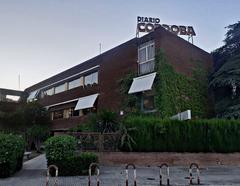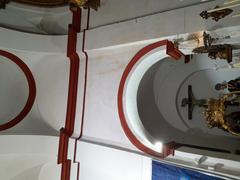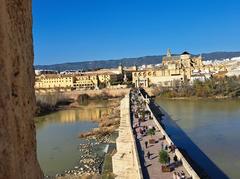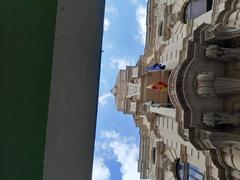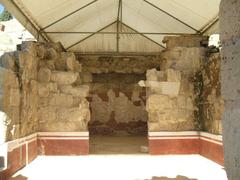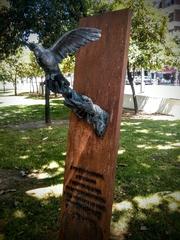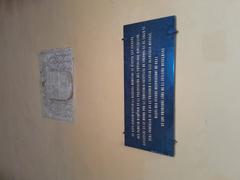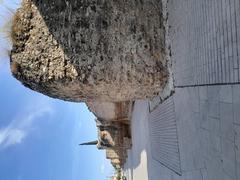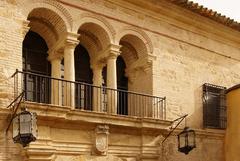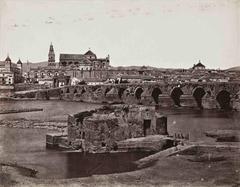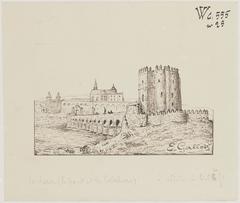Parador De La Arruzafa: Visiting Hours, Tickets, and Travel Guide in Córdoba
Date: 14/06/2025
Introduction
Nestled in Córdoba’s tranquil Brillante neighborhood, the Parador De La Arruzafa offers a remarkable fusion of historical significance and modern luxury. Built on the site of the 8th-century Al-Rusafa summer palace—once the retreat of Abd al-Rahman I, the first Umayyad Emir of Córdoba—the Parador immerses visitors in Andalusia’s rich Islamic heritage while providing contemporary comforts and amenities. With panoramic views over the Guadalquivir valley and the Sierra Morena, lush historic gardens, and proximity to Córdoba’s renowned historical sites, the Parador serves as both a tranquil escape and a gateway to the city’s vibrant culture and gastronomy (andalucia.com, theinspiredhotelsspain.com, Turismo de Córdoba).
This comprehensive guide covers everything you need to plan your visit: from historical context and practical details such as opening hours, ticketing, and accessibility, to nearby attractions, culinary highlights, and expert travel tips.
Historical Background and Significance
Origins of the Site: Al-Rusafa and the Umayyad Legacy
The Parador De La Arruzafa occupies the former grounds of Al-Rusafa, the summer palace established by Abd al-Rahman I in the 8th century. Named after a palace in Syria, Al-Rusafa served as a rural retreat overlooking Córdoba, symbolizing the emir’s authority and introducing advanced horticultural and irrigation techniques to the region. Abd al-Rahman I’s reign marked a pivotal era in Al-Andalus, laying foundations for Córdoba’s golden age (andalucia.com).
Architectural and Cultural Evolution
Although the original palace has not survived, its legacy lives on in the region’s architectural and botanical heritage. The gardens of Al-Rusafa inspired later Andalusian garden design, renowned for their shaded courtyards, flowing water, and seamless integration of architecture and nature. The Parador’s mid-20th-century architecture, designed by Manuel Sáinz de Vicuña, pays homage to this legacy with light-filled spaces, panoramic terraces, and Moorish-influenced details (theinspiredhotelsspain.com, diariocordoba.com).
Transformation into a Modern Parador
Following centuries of transformation—from Caliphal retreat to aristocratic estate—the current Parador was constructed between 1954 and 1960. Today, it stands as a luxury hotel set amidst lush gardens, echoing its historical roots as a place of leisure, innovation, and prestige (andalucia.com).
Visiting Information
Visiting Hours and Tickets
- Gardens and Public Areas: Open daily from 8:00 AM to 9:00 PM.
- Restaurant: Breakfast (7:30 AM–10:30 AM), Lunch (1:00 PM–4:00 PM), Dinner (7:30 PM–11:00 PM).
- Hotel Facilities: Access requires a room or dining reservation.
No entrance ticket is required to visit the gardens or public areas, but reservations are necessary for hotel facilities and dining. Guided tours and special events may be available; check the official website or contact the front desk for schedules and booking details.
Accessibility
- Mobility: The Parador features ramps, elevators, and adapted rooms. All public areas, gardens, and the restaurant are wheelchair accessible. Notify the hotel in advance for specific accessibility needs.
- Parking: Ample free parking is available, including spaces for electric vehicles.
Getting There
- By Car: Easily accessible via the A-4 and N-432 highways; approximately 10–15 minutes from Córdoba’s city center.
- By Public Transport: City bus lines 10 and 13 connect the main train station to the “Arruzafa” stop, a short walk from the Parador. Taxis are also readily available.
- By Air: Seville (SVQ) and Málaga (AGP) Airports offer connections; private transfers can be arranged.
Accommodation and On-Site Amenities
- Rooms: 94 rooms, ranging from Standard Twin to Junior Suites, many with balconies and panoramic views. All rooms include air conditioning, Wi-Fi, satellite TV, minibar, and safe (booking.com).
- Dining: The Parador’s restaurant features regional Andalusian cuisine, with a terrace overlooking the gardens.
- Recreation: Seasonal outdoor pool, tennis and paddle courts, children’s play area, and direct access to hiking trails in the Sierra Morena (spain.info).
- Business & Events: Meeting rooms and event spaces are available for conferences and celebrations.
- Other Services: Laundry, luggage storage, 24/7 reception.
Culinary Heritage: Gastronomy at Parador De La Arruzafa
Córdoba’s cuisine reflects its multicultural history, blending Roman, Jewish, Christian, and Moorish influences. The Parador’s restaurant is renowned for serving local specialties such as:
- Salmorejo: A creamy tomato and bread cold soup, topped with hard-boiled eggs and jamón (Spanish Sabores).
- Flamenquín: Ham-wrapped pork loin, breaded and fried—a true Cordoban classic (TasteAtlas).
- Rabo de Toro: Hearty oxtail stew, braised in red wine and spices (Visit Southern Spain).
- Berenjenas con Miel: Fried eggplant drizzled with honey, a nod to the city’s Moorish roots.
The Parador frequently features seasonal menus and hosts gastronomic events. Nearby, visitors can sample traditional cuisine at renowned local establishments such as Taberna Salinas, Bodegas Campos, and Mercado Victoria (Visit Southern Spain).
For a deeper culinary experience, consider joining a cooking class or guided market tour to explore Córdoba’s vibrant food culture (Turismo de Córdoba).
Nearby Attractions
The Parador’s location offers easy access to many of Córdoba’s most famous historical sites:
- Mezquita-Catedral de Córdoba: A UNESCO World Heritage site celebrated for its blend of Islamic and Christian architecture.
- Alcázar de los Reyes Cristianos: A fortress with lush gardens and Roman mosaics.
- Jewish Quarter (Juderia): Historic streets lined with synagogues and museums.
- Medina Azahara: The ruins of a 10th-century palatial city, 10 km from the Parador.
Nature lovers can also explore the Sierra de Hornachuelos and the Pedroches Valley, both within easy reach.
Special Events and Guided Tours
The Parador regularly hosts cultural events, from Andalusian music performances to gastronomy festivals. Guided tours of the gardens and archaeological remains beneath the property are occasionally available—check the event calendar or inquire at reception for details.
Practical Tips for Visitors
- Best Time to Visit: Spring and autumn offer pleasant temperatures for exploring gardens and terraces.
- Photography: The hotel’s terraces and gardens provide excellent views, especially at sunrise and sunset.
- Reservations: Book dining and accommodation in advance, especially during festivals or high season.
- Connectivity: High-speed Wi-Fi is available throughout the property.
- Safety: The Parador is located in a safe area with 24-hour security; emergency medical services are nearby.
Frequently Asked Questions (FAQ)
Q: What are the Parador De La Arruzafa visiting hours?
A: Gardens and public areas are open daily from 8:00 AM to 9:00 PM. The restaurant follows standard meal times.
Q: Do I need tickets to visit?
A: No entrance fee is required for gardens or terraces. Hotel facilities require a reservation.
Q: Is the Parador accessible for people with disabilities?
A: Yes, with accessible rooms, ramps, elevators, and adapted bathrooms.
Q: Are guided tours available?
A: Yes, occasionally—contact the hotel or check the website for current offerings.
Q: How do I get there from city center?
A: By taxi (10–15 minutes), city bus lines 10 or 13, or by car.
Conclusion and Next Steps
Parador De La Arruzafa stands as a testament to Córdoba’s layered history, offering guests a harmonious blend of architectural beauty, lush nature, and regional gastronomy. With its prime location, modern comforts, and proximity to the city’s most celebrated landmarks, it is an ideal base for those seeking both relaxation and cultural discovery.
For up-to-date information, bookings, and special event schedules, visit the Parador de Córdoba official website or trusted travel resources. Enhance your trip with the Audiala app for interactive guides and local insights, and follow us on social media for updates and inspiration.
Sources and Further Reading
- andalucia.com
- theinspiredhotelsspain.com
- Turismo de Córdoba
- Parador Official Website
- diariocordoba.com
- spain.info
- booking.com
- Spanish Sabores
- TasteAtlas
- Visit Southern Spain
- paradorsofspain.com
